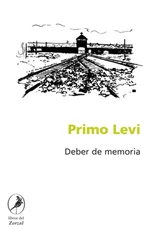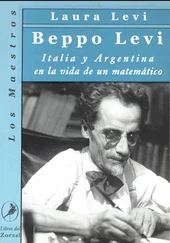Next to me, crushed against me for the whole journey, there had been a woman. We had known each other for many years, and the misfortune had struck us together, but we knew little of each other. Now, in the hour of decision, we said to each other things that are never said among the living. We said farewell and it was short; everybody said farewell to life through his neighbour. We had no more fear.
The climax came suddenly. The door opened with a crash, and the dark echoed with outlandish orders in that curt, barbaric barking of Germans in command which seems to give vent to a millennial anger. A vast platform appeared before us, lit up by reflectors. A little beyond it, a row of lorries. Then everything was silent again. Someone translated: we had to climb down with our luggage and deposit it alongside the train. In a moment the platform was swarming with shadows. But we were afraid to break that silence: everyone busied himself with his luggage, searched for someone else, called to somebody, but timidly, in a whisper.
A dozen SS men stood around, legs akimbo, with an indifferent air. At a certain moment they moved among us, and in a subdued tone of voice, with faces of stone, began to interrogate us rapidly, one by one, in bad Italian. They did not interrogate everybody, only a few: ‘How old? Healthy or ill?’ And on the basis of the reply they pointed in two different directions.
Everything was as silent as an aquarium, or as in certain dream sequences. We had expected something more apocalyptic : they seemed simple police agents. It was disconcerting and disarming. Someone dared to ask for his luggage: they replied, ‘luggage afterwards’. Someone else did not want to leave his wife: they said, ‘together again afterwards’. Many mothers did not want to be separated from their children: they said ‘good, good, stay with child’. They behaved with the calm assurance of people doing their normal duty of every day. But Renzo stayed an instant too long to say good-bye to Francesca, his fiancee, and with a single blow they knocked him to the ground. It was their everyday duty.
In less than ten minutes all the fit men had been collected together in a group. What happened to the others, to the women, to the children, to the old men, we could establish neither then nor later: the night swallowed them up, purely and simply. Today, however, we know that in that rapid and summary choice each one of us had been judged capable or not of working usefully for the Reich; we know that of our convoy no more than ninety-six men and twenty-nine women entered the respective camps of Monowitz-Buna and Birkenau, and that of all the others, more than five hundred in number, not one was living two days later. We also know that not even this tenuous principle of discrimination between fit and unfit was always followed, and that later the simpler method was often adopted of merely opening both the doors of the wagon without warning or instructions to the new arrivals. Those who by chance climbed down on one side of the convoy entered the camp; the others went to the gas chamber.
This is the reason why three-year-old Emilia died: the historical necessity of killing the children of Jews was self-demonstrative to the Germans. Emilia, daughter of Aldo Levi of Milan, was a curious, ambitious, cheerful, intelligent child; her parents had succeeded in washing her during the journey in the packed car in a tub with tepid water which the degenerate German engineer had allowed them to draw from the engine that was dragging us all to death.
Thus, in an instant, our women, our parents, our children disappeared. We saw them for a short while as an obscure mass at the other end of the platform; then we saw nothing more.
Instead, two groups of strange individuals emerged into the light of the lamps. They walked in squads, in rows of three, with an odd, embarrassed step, head dangling in front, arms rigid. On their heads they wore comic berets and were all dressed in long striped overcoats, which even by night and from a distance looked filthy and in rags. They walked in a large circle around us, never drawing near, and in silence began to busy themselves with our luggage and to climb in and out of the empty wagons.
We looked at each other without a word. It was all incomprehensible and mad, but one thing we had understood. This was the metamorphosis that awaited us. Tomorrow we would be like them.
Without knowing how I found myself loaded on to a lorry with thirty others; the lorry sped into the night at full speed. It was covered and we could not see outside, but by the shaking we could tell that the road had many curves and bumps. Are we unguarded? Throw ourselves down? It is too late, too late, we are all ‘down’. In any case we are soon aware that we are not without guard. He is a strange guard, a German soldier bristling with arms. We do not see him because of the thick darkness, but we feel the hard contact every time that a lurch of the lorry throws us all in a heap. At a certain point he switches on a pocket torch and instead of shouting threats of damnation at us, he asks us courteously, one by one, in German and in pidgin language, if we have any money or watches to give him, seeing that they will not be useful to us any more. This is no order, no regulation: it is obvious that it is a small private initiative of our Charon. The matter stirs us to anger and laughter and brings relief.
The journey did not last more than twenty minutes. Then the lorry stopped, and we saw a large door, and above it a sign, brightly illuminated (its memory still strikes me in my dreams): Arbeit Macht Frei, work gives freedom.
We climb down, they make us enter an enormous empty room that is poorly heated. We have a terrible thirst. The weak gurgle of the water in the radiators makes us ferocious; we have had nothing to drink for four days. But there is also a tap — and above it a card which says that it is forbidden to drink as the water is dirty. Nonsense. It seems obvious that the card is a joke, ‘they’ know that we are dying of thirst and they put us in a room, and there is a tap, and Wassertrinken Verboten. I drink and I incite my companions to do likewise, but I have to spit it out, the water is tepid and sweetish, with the smell of a swamp.
This is hell. Today, in our times, hell must be like this. A huge, empty room: we are tired, standing on our feet, with a tap which drips while we cannot drink the water, and we wait for something which will certainly be terrible, and nothing happens and nothing continues to happen. What can one think about? One cannot think any more, it is like being already dead. Someone sits down on the ground. The time passes drop by drop.
We are not dead. The door is opened and an SS man enters, smoking. He looks at us slowly and asks, ‘Wer kann Deutsch?’ One of us whom I have never seen, named Flesch, moves forward; he will be our interpreter. The SS man makes a long calm speech; the interpreter translates. We have to form rows of five, with intervals of two yards between man and man; then we have to undress and make a bundle of the clothes in a special manner, the woolen garments on one side, all the rest on the other; we must take off our shoes but pay great attention that they are not stolen.
Stolen by whom? Why should our shoes be stolen? And what about our documents, the few things we have in our pockets, our watches? We all look at the interpreter, and the interpreter asks the German, and the German smokes and looks him through and through as if he were transparent, as if no one had spoken.
I had never seen old men naked. Mr Bergmann wore a truss and asked the interpreter if he should take it off, and the interpreter hesitated. But the German understood and spoke seriously to the interpreter pointing to someone. We saw the interpreter swallow and then he said: ‘The officer says, take off the truss, and you will be given that of Mr Coen.’ One could see the words coming bitterly out of Flesch’s mouth; this was the German manner of laughing.
Читать дальше












